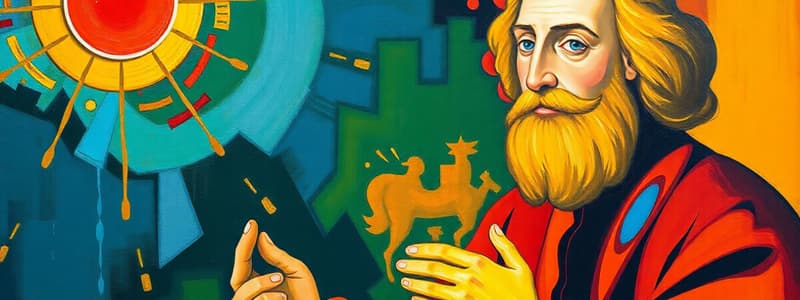Podcast
Questions and Answers
Which philosopher is associated with the idea of separation of powers?
Which philosopher is associated with the idea of separation of powers?
- Jean-Jacques Rousseau
- John Locke
- Montesquieu (correct)
- David Hume
What concept did John Locke introduce that relates to the understanding of identity and self?
What concept did John Locke introduce that relates to the understanding of identity and self?
- Social Contract
- Empirical Knowledge
- Noble Savage
- Tabula Rasa (correct)
What did Voltaire advocate for in relation to governance?
What did Voltaire advocate for in relation to governance?
- Collective ownership
- Absolute monarchy
- Separation of church and state (correct)
- Social unity
Which statement best reflects the idea of empiricism as supported by David Hume?
Which statement best reflects the idea of empiricism as supported by David Hume?
According to the Social Contract theory, what do people give up in exchange for peace and stability?
According to the Social Contract theory, what do people give up in exchange for peace and stability?
Flashcards are hidden until you start studying
Study Notes
The Enlightenment
- Reaction against absolute rule and authoritarian governance.
- Influenced by the Scientific Revolution, emphasizing reason and empirical evidence.
Global Interactions
- Age of Discovery led to European contact with Asia, Africa, and the Americas.
- Increased diversity of ideas and cultural exchange shaped Enlightenment thought.
Key Philosophers
- John Locke: Introduced "tabula rasa" (blank slate) concept, positing that knowledge comes from experience.
- Advocated for natural rights: life, liberty, and property, influencing modern democracy.
- David Hume: Supported empiricism, emphasizing sensory experience as the foundation of knowledge.
- Claimed human behavior is driven by passion rather than rationality.
Government and Society
- Montesquieu: In "The Spirit of the Laws" (1748), proposed separation of powers among executive, legislative, and judicial branches to prevent tyranny.
- Jean-Jacques Rousseau: Criticized urban pretensions, promoting a more practical and egalitarian society.
- Voltaire: Championed freedom of speech and religion, advocating for civil liberties.
Social Contract
- Concept where individuals surrender certain rights to the government for peace and stability.
- Underlined the role of government to serve its citizens and maintain order.
Secularism
- Various Enlightenment thinkers stressed the importance of separating church and state, promoting religious tolerance and personal freedom.
Studying That Suits You
Use AI to generate personalized quizzes and flashcards to suit your learning preferences.




